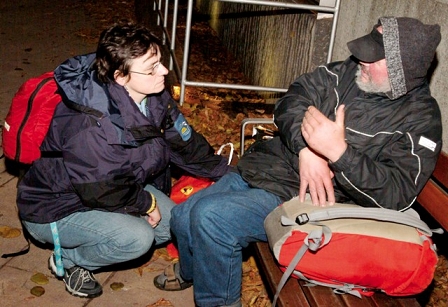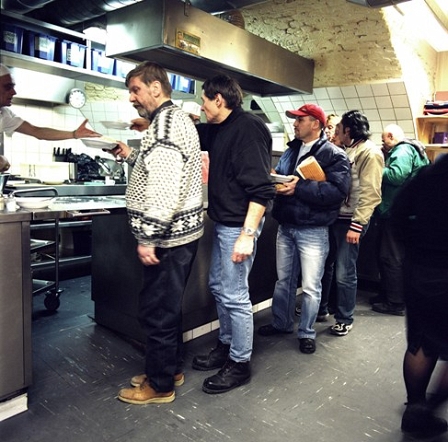Erstellt am: 8. 10. 2011 - 12:53 Uhr
Helping the Homeless
“We're approaching my zone now,” says Susanne Peter, as we pull up the white Caritas van at the Praterstern, perhaps the most notorious gathering point for Vienna's homeless population.
We walk towards a huddle of people. One young man is slumped against a low wall by the underground station. His head is in his hands and he is rocking slowly backwards and forwards as if in prayer. Two older men are tottering dangerously left and right as if on the deck of a ship in a storm and scaring the customers outside a fast-food stall. Each of the men has a can of beer in one hand and a cigarette in the other. The ground smells sharply of urine. “It's all here,” says Susanne.“There's psychological illness, alcohol and violence.”
Susanne, a determined woman in her 40s, has been working with homeless people for 25 years. With charming euphemism she calls them her “clients” and says she has been assigned to work with those who sleep around the railway station at the Praterstern because she doesn't “have any fear.” She's a well known face and scruffy figures detach themselves from the huddles near the entrance of the underground station and greet her, passing their yellow beer cans into their left hands so that the right is free to shake her hand.

gruft
Susanne chats away with the homeless with the familiarity of a strict older sister. While offering them cigarettes, she badgers them about their health and reminds them that there are alternatives to the hard life on the street. It's early Autumn and it's been a mild day, but now at 8pm, I'm shivering under my thick pullover. Winter is around the corner. Susanne is trying to persuade her “clients” to come to the free shelter where she works – the Gruft, a cellar under the Mariahilf church on Vienna’s main shopping street. They seem pleased to see Susanne but fake annoyance at her tenacity.
The Gruft offers the homeless a bed in a large dormitory as well as three square meals a day and the chance to wash themselves and their clothes. They can stay the night but they don’t have to. The Gruft is warm, well lit and clean inside. With its hustle and bustle and whirring washing machines, it feels like any youth hostel you might find anyway in the world. There is counseling available to help people find new homes and work as well as healthcare. But it's a tug of war getting the homeless to take advantage of these opportunities.
“I want to be alone,” insists Alois, a short red face man in his mid-50s who is originally from Vorarlberg. “I don't want to be among the masses. You can't get any sleep at the Gruft anyway.” He says he sleeps on building sites. “It's OK if you ask the site manager and make sure than you don't leave any rubbish behind.” He revels in telling me that he is fine. He says he is fitter than people half is age. Susanne dismisses this as bravado. “No one is voluntarily on the streets,” she says.
The vast majority of the homeless we meet on the streets are male. Susanne explains that that is partly because it is usually the men who lose their apartment after divorce cases but also because women are much better at seeking and accepting help. When that is official help, such as the Gruft, that's positive, but often, Susanne says, homeless women are taken in by men who then take advantage of this dependence: “Many women are stuck in abusive relationships.”
With men it is misplaced pride that keeps them on the street. Many feel ashamed of their predicament and fear any sense of dependence. It takes a courage to turn up at the Gruft and ask for help and sometimes it takes years before a homeless person feels ready to take that step – Susanne's job is to make that step easier and break down that inhibiting sense of shame.
Anyone can be struck by homelessness. Susanne has seen former lawyers, engineers and police officers arrive at the Gruft. Often the trigger is divorce or redundancy and the descent into destitution can be dizzyingly rapid, but the climb back out can be painstakingly slow. Susanne sees it as her job to remove some of the stones in the path of that recovery.

gruft
At the Donauinsel we meet a man called Xandi who has been living rough for over a decade. He lives in a tent hidden in the thorny bushes along the Neue Donau but he is often moved on by the forestry authorities that patrol the 22km long artificial island, making him and the rest of the homeless hard to track down. Susanne hasn’t seen him in 3 years. Xandi is bearded and burned dark by the sun, his brown scalp showing under unkempt and thinning long hair. He has gentle eyes and, smiling, he says he is the black sheep of his family.
Susanne says the black sheep is always the special one and he laughs, revealing a mouth almost emptied of teeth. But despite this Xandi looks strangely handsome very charismatic, like an old sailor. But he is not old. I'm shocked when he tells me he's just 46 – he looks at least a decade older.
As we sit on a bench looking over the Danube he chats about old acquaintances and the fortunes of the Gruft football team. His voice is soft and he is well spoken. He invites (or perhaps challenges) me to stay in his tent in February to see how warm it is. But Susanne is worried – she estimates he has lost around 20 kilos since she last saw him and later tells me that is a classic indicator of a tuberculosis infection – or worse. Homeless people are particularly vulnerable to tuberculosis, with infection rates of the deadly lung condition up to 100 times more prevalent among the homeless population than in the general population. It’s partly because of crowded living conditions in shelters, but also inadequate nutrition and the effect of chronic stress.
Susanne urges Xandi to come to the Gruft or actively look for a proper roof over his head and above all to get a chest X-ray but, like a school boy being told off by his mother, he becomes sullen when the conversation turns to practicalities. It's a balancing act for Susanne to know how far to push it. Past experience has taught her that homeless people want to be searched out and persuaded because it shows them someone cares.
But if she pushes the “nagging” too far, she risks the contact being broken off. In the end she hands Xandi a winter sleeping bag and leaves him on his bench overlooking the Danube. “I don't want to make life comfortable for him out here,” she says. “I want him to see a proper solution.” But she doesn't want him to freeze either.
Dr Thomas Ginsel, the Gruft's psychologist who accompanies Susanne on her rounds, fears that Xandi is suffering from depression, despite his demonstrative cheerfulness. He says it is often the more mentally fragile who choose the wide, lonely spaces along the Danube rather than the crowds that sleep around the city's train-stations. Depression, one of the factors inhibiting the homeless from accepting help, is just one of the mental illnesses that afflict those living rough. Eight out of ten suffer from some sort of addiction, with alcoholism the most prevalent. The rate of diagnosed cases of schizophrenia is 10-15% compared to between 0.6 and 1% in the general population. Mental illness is a vicious circle – it is often the root cause of homelessness and then living rough exacerbates the condition. The paranoia associated with schizophrenia sometimes makes people afraid of the confinement of an apartment.
Susanne recently had a breakthrough. Over three years ago she found a man who had made a home out one of the concrete toilets along the Danube. She began to work on building up trust but for months he wouldn't even let her see him. For an hour at a time, she would stand outside the toilet gently talking to him through the closed door, slowly coaxing him to accept her help. After three long years of effort he finally accepted. Now he is living in an apartment in the city.
“They know I'll never give up,” she says, flashing a smile.
Dieses Element ist nicht mehr verfügbar


